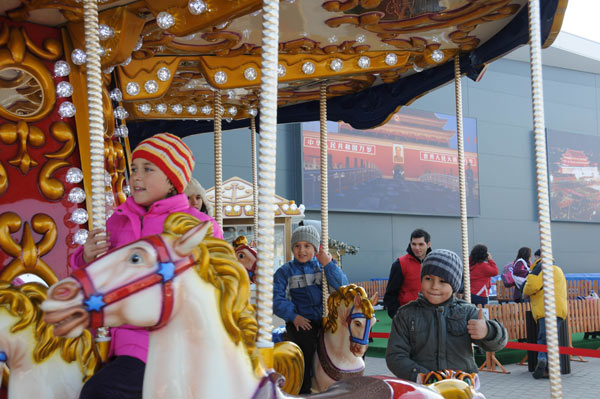 |
|
Children play on a merry-go-round in front of a newly-opened Chinese shopping mall in Bucharest, Romania, in this file photo. LIN HUIFEN / XINHUA |
Premier Li Keqiang begins a visit to Romania and Uzbekistan on Monday, as he promotes China's new opening-up policies and seeks new economic opportunities.
Li will pay an official visit to Romania beginning on Monday and attend a meeting of leaders from China and Central and Eastern Europe in the Romanian capital Bucharest. He will also attend the Shanghai Cooperation Organization prime ministers' meeting in the Uzbek capital Tashkent on Thursday and Friday.
The trip will be Li's first visit to Eastern Europe since he took office in March, and also marks the first visit of a Chinese premier to Romania in 19 years.
A string of economic agreements and contracts are expected to be signed during his visit, said Zhang Xiangchen, assistant minister of commerce.
A number of projects, such as the construction of highways and power plants, are also being considered, and China is planning to expand imports of dairy and agricultural products from Romania, he said.
The agreement, which aims to facilitate road transportation among the SCO members, is expected to be signed at the 12th prime ministers' meeting of the SCO member states. According to the agreement, an Asia-Europe transportation corridor could be established in 2017, Vice-Foreign Minister Cheng Guoping said.
Trade between China and Central and Eastern Europe amounted to $52.1 billion in the first 10 months of this year. Trade between China and Romania totaled $3.3 billion over the same period, according to the Ministry of Commerce.
Experts said they expect Li's upcoming visit, the first European trip of China's State leaders after the reform-setting Third Plenum, to merge Li's consistent diplomatic style with a focus on the economy.
Li visited Europe in May when China and the European Union were involved in a trade dispute over the export of China-made solar panels. Li helped promote China's high-speed rail technology in Thailand, where an exhibition showcased the technology, safety and cost advantages of the Chinese system.
Zhou Yongsheng, professor of international relations at China Foreign Affairs University, said Li's overseas visits in May and October have contributed to the final settlement of trade disputes and the marketing of China's high-speed railway system.
"At a moment when China has just rolled out reform initiatives for the next decade and is determined to open its market to the world, relations with countries in Central and Eastern Europe as well as Central Asia can benefit all sides," Zhou said.
The key Party meeting that concluded earlier this month pledged more openness to global markets and foreign businesses.
The document released after the meeting said restrictions on overseas investors are to be lifted for industries that include services for children and the elderly, architectural design, accounting and auditing, commerce, logistics, and e-commerce. Industries that will open up gradually for investors include financial services, education, culture and medical care, while the opening-up of the manufacturing sector will be increased.
Xu Qinhua, deputy director of the Institute of Russia, Eastern Europe and Central Asia Studies at Renmin University of China, said that although Central and Eastern European countries are the least-developed in Europe, they are in a strategically important area and have great economic potential.
Besides, Xu said, both the CEE countries and China are at a crossroads of economic restructuring, and their economies are complementary.
"These countries are on a similar level of economic development like China, so our products are more welcome at their market than in Western Europe, where the quality standard is much higher," she said.
Besides, Xu said, the CEE countries, due to their strategically important locations, can serve as China's gateway to the Western market.
"For instance, even though Chinese products cannot enter a Western European country's market with a relatively low tariff, it would be possible for us to take a route from a CEE country, where we have set up a free trade agreement, and then sell those products to the Western European market in an indirect way," she said.
As for Central Asian countries, Xu said although bilateral trade at the moment is relatively low, cooperation in the energy, transportation and telecommunication sectors are highly likely.
"The current economic exchanges are limited by cultural differences. Products made in Turkey or other Islamic countries may enter their market easier."
Besides, although the regional economic exchanges between the Xinjiang Uygur autonomous region to those countries are rising, it is difficult to track the real trade statistics, since most of the deals were made without proper customs procedures.
"Energy resources remain the most advantageous edge for these countries to compete in the Chinese market, and the room for cooperation is large," she said.
To this end, the connectivity between China and central Asian countries are very important.
"Whether through pipelines, highways or railways, the regional economy will be more integrated and prosperous if the two areas are better connected to allow capital, products, personnel and technology to flow," Xu said.
Contact the writers at [email protected] and [email protected]
|
|
|
|
|
|
|
|
